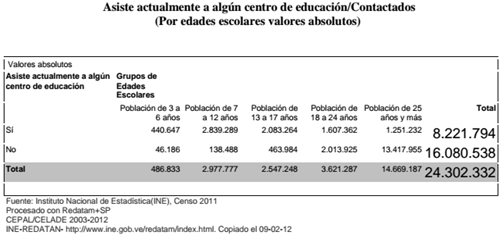
doi.org/10.15198/seeci.2020.52.17-28
RESEARCH
EDMODO: AN E-LEARNING PLATFORM FOR INCLUSION
EDMODO: UNA PLATAFORMA DE E-LEARNING PARA LA INCLUSIÓN
EDMODO: UMA PLATAFORMA DE E-LEARNING PARA À INCLUSÃO
María Elena del Valle Mejías1
1Metropolitan University of Caracas. Venezuela
[1] María Elena del Valle Mejías: PhD in Educational Sciences at the Pedagogical Institute of Caracas, postdoctorate in Semiotics and Pragmatics at the Complutense University of Madrid. Certified researcher from the Complutense University of Madrid, the international group CONCILIUM and CELARG. Director of the Master in Communication at TECH University. Guest Professor at the University of Vigo. Honorary Professor at the Rey Juan Carlos University. Regular collaborator of the Masters at ESERP and EAE. mvillalba@unimet.edu.ve
ABSTRACT
This article summarizes the pedagogical experience of including the LMS: edmodo within the educational resources of a Venezuelan college and a university. In its development, the most important characteristics of the environment, the implications of including, in teaching, the description of the socio-economic context of Venezuela, the use of the LMS and the benefits generated therefrom are addressed and, finally, the conclusions reached after assessing the impact of its application. The edmodo e-learning platform has become an inclusion mechanism by offering free-access environments, repositories of digital resources and effective communication mechanisms between students and teachers. This is a logical part of the process of adaptation to the new information technologies by the educational sector, being an indication that it goes well beyond the arbitrary and expensive distribution of computer equipment in the classroom: the logical path of this adaptation, given the general experience with ICTs, is to create software tools that allow us to use hardware for specifically academic purposes that, in addition, involve some type of advantage or improvement over the analogical class.
KEYWORDS: edmodo, inclusion, e-learning, Venezuela, ICT, software, platforms
RESUMEN
El presente artículo resume la experiencia pedagógica de incluir dentro de los recursos educativos en un colegio y una universidad venezolana el LMS: edmodo. En el desarrollo del mismo se abordan: las características más importantes del entorno, las implicaciones de incluir en la enseñanza elementos tecnológicos y filosóficos provenientes del e-learning, la descripción del contexto socio-económico de Venezuela, el uso del LMS y los beneficios generados del mismo y finalmente las conclusiones a las que se llega luego de valorar el impacto de su aplicación. La plataforma de e-learning edmodo se ha constituido en un mecanismo de inclusión al ofrecer entornos de acceso gratuito, repositorios de recursos digitales y mecanismos de comunicación eficaces entre alumnos y profesores. Esto es parte lógica del proceso de adaptación a las nuevas tecnologías de la información por parte del sector educativo, siendo un indicativo de que la misma va mucho más allá de la arbitraria y cara distribución de equipos informáticos en las aulas: el camino lógico de esta adaptación, ante la experiencia general con las TIC, es el de crear herramientas de software que permitan el uso del hardware con fines específicamente académicos que, además, supongan algún tipo de ventaja o mejora con respecto a la clase analógica.
PALABRAS CLAVE: edmodo, inclusión, e-learning, Venezuela, TIC, software, plataformas
RESUMO
O presente artigo resume a experiência pedagógica de incluir dentro dos recursos educativos de uma escola e uma universidade venezuelana o sistema de gestão de aprendizado: edmodo. No seu desenvolvimento são abordadas: as características mais importantes do entorno, as implicações de incluir no ensino, elementos tecnológicos e filosóficos que provém do e-learning, a descrição do contexto sócio-econômico da Venezuela, o uso do sistema de gestão de aprendizado e os benefícios gerados por ele, e finalmente as conclusões que são alcançadas após valorizar o impacto da sua aplicação. A plataforma de e-learning edmodo tem se constituído como um mecanismo de inclusão ao oferecer ambientes de acesso gratuito, repositórios de conteúdos digitais e mecanismos de comunicação eficazes entre estudantes e professores. Isto é parte da lógica do processo de adaptação às novas tecnologias de informação pelo setor educacional, sendo um indicativo de que a mesma vai além da arbitrária e cara de distribuição de equipamentos informáticos nas aulas: o caminho lógico desta adaptação, perante a experiência geral com as TIC, é criar ferramentas de software que permitam o uso de hardware com fins especificamente acadêmicos que, além disso, suponham algum tipo de vantagem ou melhoria com respeito as aulas analogicas.
PALAVRAS CHAVE: edmodo, inclusão, e-learning, Venezuela, TIC, software, plataformas
Correspondence:
María Elena del Valle Mejías. Metropolitan University of Caracas. Venezuela. mvillalba@unimet.edu.ve
Received: 07/08/2019
Accepted: 12/09/2019
Published: 15/07/2020
How to cite the article:
Del Valle Mejías, E. (2020). Edmodo: an e-learning platform for inclusion. [Edmodo: una plataforma de e-learning para la inclusión]. Revista de Comunicación de la SEECI, (52), 17-28. doi: http://doi.org/10.15198/seeci.2020.52.17-28
Recovered from http://www.seeci.net/revista/index.php/seeci/article/view/613
1. INTRODUCTION
Since the beginning of the 21st century, education in the world has been materializing important structural changes. Undoubtedly, educating in this environment today implies multiple skills and expertise. Our interlocutor in the classroom is, in many cases, more skilled in technological tools than his own teacher. But having these skills does not guarantee at all that you have the criteria formed to make rational and critical use of them.
Learning platforms on the web have multiplied as the years go by, some with more or less traffic but, undoubtedly, many of them are the almost forced support of today's teachers, as can be inferred from Vaquerizo-García (2011) and from the notes on “mobile learning” by Alises Camacho (2017).
The structure to be developed will be as follows:
2. Edmodo: an LMS and a social network
3. Venezuela, where survival is the norm
4. Benefits of the platform in the Venezuelan context
5. Conclusions and Recommendations
6. Bibliography
2. EDMODO: an LMS and a social network
The first thing we will do in this section is to dwell on the main features of the platform that also distinguish it from the existing ones. We will describe the attributes of edmodo as a collaborative learning environment and deepen its potential.
What are the characteristics that any LMS should have?
According to Clarenc (2012 and 2013) all e-Learning platforms should comply with the following:
Interactivity
Bedoya (2007) defined it as “the capacity of the receiver to control a non-linear message to the extent established by the sender, within the limits of the asynchronous communication medium”. The different LMS must provide, through each of the resources they provide, the possibility for the student to relate on their own terms, with the environment and with the materials housed in it.
Flexibility
The LMS must have the property of adapting to the user's needs as well as to their possibilities. In terms of time and space, offer the user the possibility of effectively managing the time available, as well as entering and leaving the platform in the spaces fitted for that purpose. Similarly, the learning curve, within the environment, fluctuates according to the capabilities of each user and responding to the purposes set by the curriculum architect.
Scalability
Understood as the operational capacity of the environment so as not to affect its operability, by the number of users connected simultaneously.
Standardization
In this case, it refers to a common model, shared to some extent by learning environments. (SCORM). To meet the objectives that have been set, these spaces comply with explicit or implicit rules through which the achievement of a standard model matching the elements that are presented independently is guaranteed.
Ubiquity
Linked to omnipresence, ubiquity is defined as the ability of LMS to reach all spaces in which there is an internet connection. This way, access to all resources within the environment is guaranteed to those who, regardless of distance, can access it.
According to Clarenc (2012), “The ubiquity in an LMS is the ability of a platform to make the user feel omnipresent: it gives him the assurance that he will find everything he needs” (p. 78). This way, the characteristics of the LMS mentioned above depend directly on it.
Persuability
As Clarenc explains (2012 and 2013), Persuability is a word composed of two terms (persuasion and usability) and implies the integration and articulation of four characteristics (Functionality, Usability, Ubiquity and Interactivity). Edmodo has a physiognomy similar to one of the most popular social networks: Facebook which allows students to move in it by association as in a place already common to their memory. The enumeration of characteristics could take us more lines than allowed, with which, with the selected ones, the most important elements have been saturated.
In the case of edmodo, all of them are not only fully fulfilled but also materialized in a sensitive way in aspects related to the so-called administrative management of resources, communication and related tools. Edmodo provides simple access for the student as well as the teacher who uses the platform. By placing his data, (it is not necessary to have email) the student registers and creates his profile. It has monitoring mechanisms that allow the teacher to keep track of the student's process, post placement, homework assignments, evaluation performance, etc.
From the student's registration on the platform, their data are recorded in the Grade book, a format in which their performance is registered and can also be exported to other formats, such as Excel, for example.
In relation to access to resources and materials, located in folders, they allow the student to download them in a simple way, as well as giving students the possibility of uploading contributions from their profile to the homepage that they share with their classmates and teacher. Similarly, edmodo's partnership with Microsoft and Google allows the student to store their work in their drive and the teacher to access them and place the relevant marginal comments.
For communication, edmodo offers the advantage of sending to the user an email indicating that a publication has been made that corresponds to him, it notifies him of tasks as well as the qualifications obtained in them. It also offers the possibility of sending collective messages - to entire groups - or individual messages, to students or colleagues. The start screen of the course works as a wall in which relevant information can be posted, as well as giving priority to some element by setting the message permanently at the beginning of the screen.
In relation to the data, edmodo makes it possible to store grades in a virtual book in which one’s performance can be observed in a transversal way. That grade book is exportable to different formats such as Word or Excel. In the register of evaluations, the teacher can perform an analysis of the students' performance in specific questions of an exam, establishing in which of the expected competencies weakness was observed.
De la Torre (2006), defines Web 2.0 as:
A way of understanding the Internet that, with the help of new computer tools and technologies, promotes that the organization and the flow of information depend on the behavior of the people who access it, allowing not only much easier and centralized access to the contents but also their own participation both in their classification and in their own construction, by means of tools that are increasingly easier and more intuitive to use. (De la Torre, 2006, p. 55).
Edmodo, from its distinctive physiognomy, allows students to access it almost naturally, to create their profile, upload their photography, access the different courses, attach documents, insert hyperlinks because their intuition tells them the way, in line with the advantages provided by Fombona (2013 and 2016) and according to the principle of collaborative learning invoked by Pineda Martínez and Castañeda Zumeta (2013) or by Zamora Sánchez et al. (2018).
Edmodo seems like an educational social network, a virtual community in which the fundamental objective is the learning of its members. Alonso García, S., Morte Toboso, E., & Almansa Nuñez, S. (2015) indicate the following as characteristic elements of a social network for educational purposes:
Indeed, edmodo provides through its platform the mechanisms to progressively develop this playful framework in which those elements of its daily environment are combined with learning opportunities that emerge from it. The aforementioned tool allows us to partake in a positive way in the Venezuelan reality that will be described below.
3. VENEZUELA, WHERE SURVIVAL IS THE NORM
The 21st century, very contrary to what made up statistics may say, surprises Bolivar's homeland in a very precarious situation. The aforementioned precariousness is generous and unreservedly irrigated in all orders of national life. Economy, Health and who else concerns us: Education goes through one of the darkest moments in its history. With a country situation that has forced many to self-exile, the human capital intended to train others is increasingly less expert, educational policies that, far from enhancing excellence, what have done is to standardize mediocrity and an economic situation of absolute precariousness draw a scenario that is not encouraging at all.
Bravo (2015) makes a crude diagnosis of the educational situation in Venezuela and the main signs of the behavior of the School Education System, carried out in a constitutional perspective and in view of the strengthening needs of inclusively democratic education.
Their results indicate that their main indicators, built with the most official information available, are going against what is established in Article 103 of the Constitution of 99. One of the signs it describes in a neat way is the level of exclusion that exists in the School groups.
Source: National Statistics Institute (INE), 2011 Census.

Figure 1. Assistance to education centers.
There is educational exclusion and much, says the author, as reported by the 2011 Census in absolute terms with respect to Venezuelans who should be included in some type of educational activity. In addition to this alarming reality must be taken into account, there is the fact of the challenging situation that Venezuelan households must face daily so as not to be another point in that statistic, so that percentage that manages to access public or private education has many other problems to deal with.
The newspaper El Nacional dated 15 April 2016 noted on its pages that, that year, Venezuela would continue in recession, it is expected to fall 8%, and 4.5% in 2017 after contracting 5.7% in 2015. According to forecasts of the International Monetary Fund for Latin America, in which it adjusted downwards the predictions it had issued in January. The IMF reported that in the Caribbean nation the fall in oil prices deepens the pre-existing macroeconomic imbalances, so inflation will be close to 500% in 2016 and 1,600% in 2017.
Complementing this difficult circumstance is the cost of the Family Food Basket. The Family Food Basket only refers to food products, without taking into account personal hygiene products. During the month of November 2016, it rose to 544,990.78 bolivars, this increase was 18.4% as compared to the previous month, equivalent to 84,609.23 bolivars, that is, 20.1 minimum salaries are currently needed (27,092.10 bolivars) to acquire the food basket for five members.
In this sense, the average number of families in Venezuela has to choose daily between feeding their members and sorting out the rest of their needs with some dignity. Education and all that it implies: uniforms, books, work materials, passes in a loud way to the last places in the priorities.
As a last point, not to delve into more dramatic ones such as insecurity and health crisis, there are the demonstrations that occur in Venezuela, but especially in Caracas, the place of our study. The peaceful demonstrations or with a certain degree of violence amounted in 2014 to more than 120, so that a student can prepare to go to his school, but some of these contingencies can prevent it.
4. BENEFITS OF THE PLATFORM IN THE VENEZUELAN CONTEXT
In the very brief description in previous lines, we indicated three fundamental elements:
In Venezuela, access to specialized literature is increasingly complicated and expensive. Similarly, costing educational materials is an undertaking that puts more than one family budget on the rack.
The edmodo platform has a space that functions as a library, both personal and of the group to which the student belongs. The group in which you are a student registers has a repository of materials called: FOLDERS.
Source: self-made.
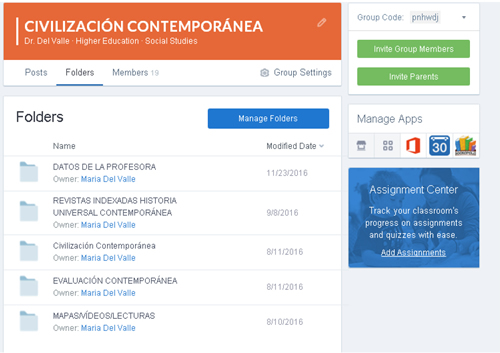
Figure 2. Edmodo platform Folders section.
In them, the teacher can place all the organized digital materials by using the criteria he wishes. By topics, by units, by type of resource, etc. Also, in the tab called: Library/Library, the student can store not only the materials that his teachers send him but also those that he gathers according to his interests.
Source: self-made.
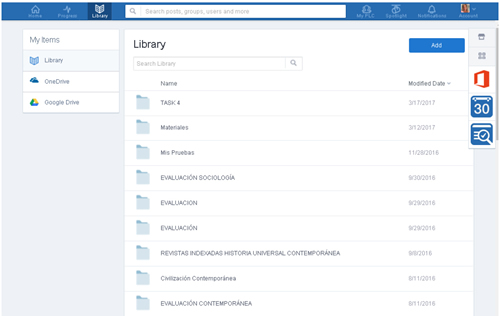
Figure 3. Edmodo platform library.
Edmodo has the advantage of being able to make a direct link with the information stored in the Gmail Drive or in the Microsoft cloud, this way the teacher can add comments within the same document and have the student receive them online. This not only facilitates the work but also implies a significant reduction in the costs of the parents and the student.
Additionally, edmodo has a resource repository called: Spotlight in which both the student and the pupil will find state-of-the-art educational resources for addressing diverse contents.
Source: self-made.
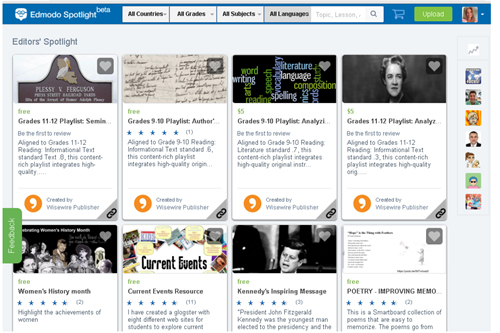
Figure 4. Edmodo platform Spotlight section
Among the advantages that enhance inclusion in education, there is the possibility provided by edmodo for the student to record their work digitally without having to print them. The assignments are designed so that the student can attach their homework without being limited in the use of resources such as images, photographs, graphics, cartoons, links to videos etc.
Source: self-made.
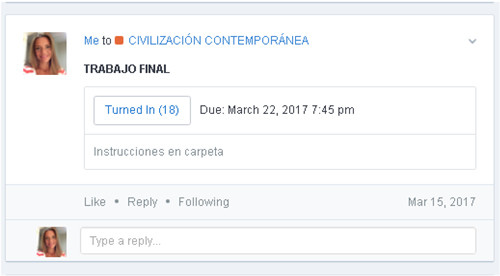
Figure 5. Edmodo platform assignments.
Finally, the edmodo platform is positioned as a space for communicational convergence in which both students and teachers can post notes at the time they deem appropriate. They can send messages to the group in general and messages to their teacher in particular, which allows everyone to know about any contingency that makes it impossible to reach the classroom.
5. CONCLUSIONS AND RECOMMENDATIONS
All the benefits we have described are certainly encouraging but, like every tool to be used, it has its demands. In order to make proper use of the platform, as well as to generate the materials that will be shared on it, both students and teachers must receive training.
For the achievement of this purpose we have been training in the management of the platform and in the complexities of the generation of materials for educational environments on the web. We are convinced that tools such as edmodo, used by trained teachers, will make a perfect hinge in the processes of inclusion that are undertaken from public policies or from initiatives generated by international non-governmental organizations.
AUTHOR
María Elena Del Valle Mejías
Born in Caracas, Venezuela, on March 10, 1971, graduated as Professor from the Libertador Pedagogical University in 1992, with a specialization in Economic and Social History of Venezuela at Santa María University, with a Master's Degree in Economic and Social History of Venezuela, thesis with publication mention and sum cum laude, Doctor of Education Sciences in the Pedagogical College of Caracas, with a postdoctorate in Semiotics and Pragmatics at the Complutense University of Madrid, has projects funded by UPEL and with participation of the Complutense University of Madrid, with projects funded by FONACIT, she is a certified researcher at the Complutense University of Madrid, the international CONCILIUM group and the CELARG, she is a regular speaker at national and international events and is engaged in the research line, Language Sciences and with twelve years of research in the area of discourse analysis. Ordinary Professor of the Libertador Pedagogical University. CYTED accredited researcher, AECID, professor at UNIMET. Director of the Master’s Degree in Communication at TECH University. Guest Professor of the University of Vigo. Honorary Professor of Rey Juan Juan Carlos University. Regular collaborator of the Master’s Degrees at ESERP and EAE.
mvillalba@unimet.edu.ve
Orcid ID: https://orcid.org/0000-0002-8759-6171